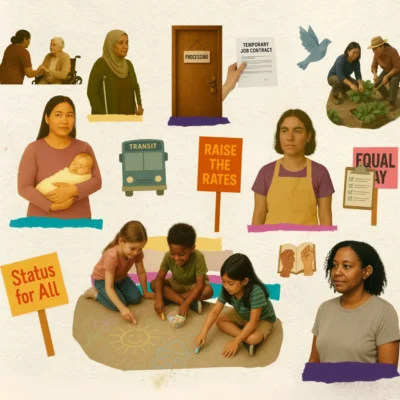Economic security
Economic security
Working to improve economic security
In BC, like elsewhere around the world, economic insecurity disproportionately impacts women and people who are marginalized because of their gender. At West Coast LEAF, we know that the aims of gender equality and justice cannot be achieved without the economic security that enables people to live with dignity and safety.

Women and people who are marginalized because of their gender are overrepresented in low-wage, precarious, and non-unionized work; experience higher levels of poverty; and face significant discrimination and harassment at work. This is especially true for those who are also impacted by racism, ableism, and/or colonial displacement and violence.
Work in progress
We are building a feminist economic framework for BC to advance economic security for women and all people who experience gender-based discrimination. Our goals include ensuring that everyone has access to a standard of living for themselves and their families that allows them to live with dignity and safety, and without discrimination.
We believe that everyone deserves the support and resources necessary for them to thrive. To eradicate poverty, we need to advance economic equality for women and all people who experience gender-based discrimination. The feminization of poverty and the gendered division of caregiving labour also means that child support and spousal support are important feminist issues.
We make regular law and policy submissions to government and work alongside community partners to address the gendered dimensions of poverty. This includes recognizing that poverty is interwoven with overlapping systems of oppression (e.g., colonialism, patriarchy, racism, ableism, white supremacy, and capitalism).
BC has one of the highest gender pay gaps in Canada. The gap is much worse for women and people who experience gender-based discrimination who are Indigenous, racialized, migrant, disabled, older, or are caregivers.
We have long called for BC to implement pay transparency and pay equity legislation—to both reveal and eliminate pay discrimination. To achieve economic security in a meaningful way, we need pay equity to proactively address the systemic undervaluing of work done by women and people who are marginalized because of their gender.
Women and all people who experience gender marginalization are over-represented in low-wage, precarious, and part-time work in BC. About twice as many women work part-time compared to men in BC. Achieving equality in pay requires urgent action to strengthen worker protections and ensure a living wage for all workers.
Statistics around employment do not capture the experiences of sex workers. Sex workers are not recognized as employees, and their work is criminalized and excluded from research about wages and employment. We advocate to stop the enforcement of all sex work related offences to prioritize sex workers’ health, safety, and economic security.
The majority of unpaid caregiving work in our society continues to be performed by women. The lack of access to child care, often due to its prohibitive cost, can force women and people who are marginalized because of their gender into financial dependence. This undermines their ability to flee violence, parent their children, and fully participate in many aspects of society.
We advocate for affordable, equitable, and accessible child care. We regularly monitor government progress in this and other areas through accountability mechanisms.
